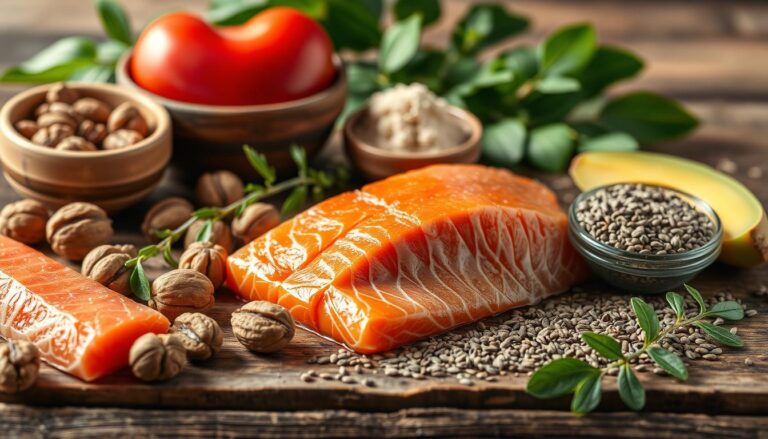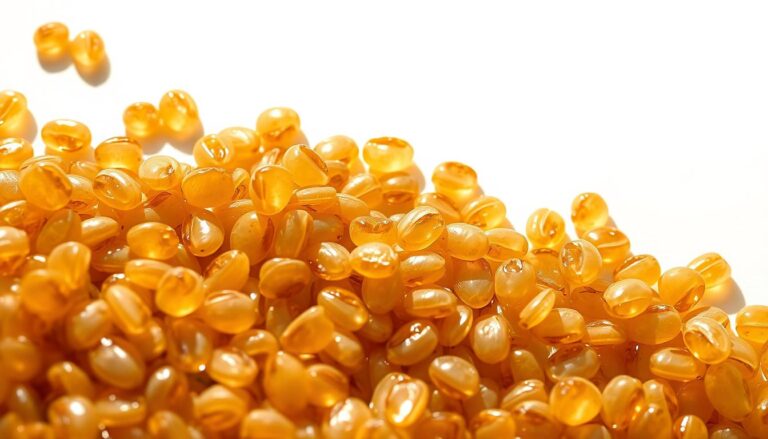Cancer treatment is a complex challenge. Every part of a patient’s well-being is important for a good outcome. In this guide, we look at two diets: vegetarian and ketogenic. Which one could improvecanceroutcomes?
We’ll explore how diet and cancer have been linked over time. We’ll also look at the latest research on these diets. You’ll learn about their nutritional benefits and how they’re used in cancer treatment.
Key Takeaways
- Vegetarian and ketogenic diets offer distinct nutritional profiles and potential benefits in cancer treatment.
- Historical and current research suggests that dietary choices can significantly impact the progression and management of cancer.
- Understanding the mechanisms by which these diets influence cancer cells and treatment outcomes is crucial for informed decision-making.
- Implementing dietary changes during cancer treatment requires careful planning and collaboration with healthcare providers.
- Recognizing the potential risks and safety considerations is essential when adopting a vegetarian or ketogenic diet for cancer management.
Understanding the Role of Nutrition in Cancer Treatment
The link between nutrition and cancer has been studied for years. Experts have found that what we eat affects cancer risk and treatment success.
Historical Perspective on Diet and Cancer
For a long time, we’ve known that diet affects cancer risk. Eating too much red meat and processed foods can increase cancer risk. On the other hand, eating lots of fruits, veggies, and whole grains can lower it.
Current Scientific Understanding
Today, we understand how nutrition and cancer interact. What we eat can influence cancer growth and treatment results. Experts recommend eating more plants to help prevent cancer.
Impact of Dietary Choices on Cancer Cells
What we eat can change how cancer cells grow. Some studies suggest a diet low in carbs and high in fat might slow tumor growth. But, more research is needed to confirm this for all cancers.
| Dietary Approach | Potential Impact on Cancer |
|---|---|
| Whole Foods Plant-Based Diet WFPBD | Consistently associated with reduced cancer incidence |
| Ketogenic Diet | Limited evidence suggests potential benefits, but more research is needed |
As we learn more about nutrition and cancer, doctors and patients must work together. They need to explore the good and bad of different diets in cancer care.

Defining Plant-Based and Ketogenic Approaches
In the fight against cancer, two diets are getting a lot of attention. The whole foods plant-based diet (WFPBD) and the ketogenic diet (KD) are different. They have different amounts of macronutrients and can affect cancer cells and health.
The whole foods plant-based diet is all about eating lots of fruits, veggies, whole grains, and nuts. It’s about getting lots of nutrients from these foods not just counting calories. On the other hand, the ketogenic diet is high in fat low in carbs, and has some protein. It aims to make the body use fat for energy instead of carbs.
- The WFPBD focuses on whole, plant-based foods. These foods are full of fiber, vitamins, minerals, and antioxidants.
- The KD includes foods like meat, dairy, and some veggies. It’s low in carbs.
Both diets have their own role in fighting cancer. Research is looking into their benefits and risks. Knowing what each diet is about is key to understanding how they can help manage cancer.
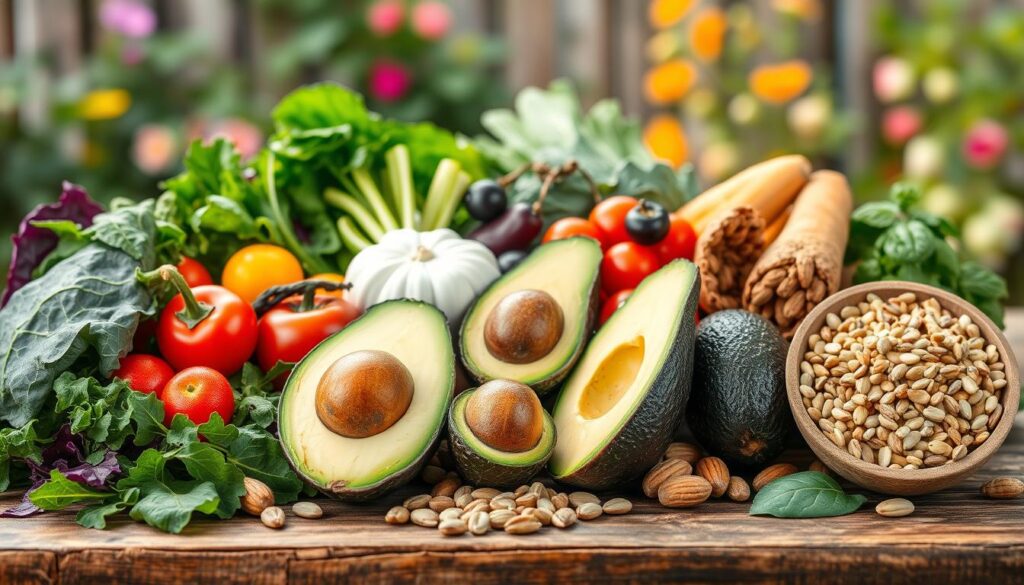
The American Institute for Cancer Research (AICR) and World Cancer Research Fund WCRF say that avoiding tobacco eating right, staying active, and keeping a healthy weight can reduce cancer risk over time.
Vegetarian and Ketogenic Diets for Cancer Treatment
Nutrition is key in cancer treatment. Whole-food, plant-based diets (WFPBD) and ketogenic diets (KD) are getting attention. They might help in cancer treatment. Let’s look at how they compare and the science behind them.
Comparing Nutritional Profiles
WFPBD and KD are very different. WFPBD focus on fruits, veggies, whole grains, and legumes. They are full of phytochemicals and fiber. On the other hand, KD are high in fats and low in carbohydrates. This can lead to weight loss and lower inflammation and insulin levels.
Scientific Evidence and Research Findings
Studies show plant-based diets help prevent cancer. But, there’s no direct research on WFPBD or KD for cancer. Still, new studies hint at their benefits:
- WFPBD might fight cancer with their fiber and phytochemicals. These support gut health and reduce inflammation.
- KD could slow cancer cell growth by using β-hydroxybutyrate instead of carbohydrates.
Clinical Applications
WFPBD and KD might help in cancer treatment. Doctors and patients should choose the best diet together. It depends on the patient’s needs, preferences, and cancer type.

A healthy diet with proteins, carbohydrates, fats, vitamins, and minerals can help the body combat cancer and tolerate treatment.
The Science Behind Ketogenic Diets and Cancer
The ketogenic diet changes how our bodies use energy, from glucose to ketone bodies. It’s being studied for its possible benefits against cancer. This change might help tumors with certain genetic changes, like PIK3CA mutations. But, the science is complex, and its effects on cancer vary by tumor type.
Studies in mice show that a ketogenic diet might slow down some cancers by cutting off glucose. Ketone bodies, made when we’re in ketosis, could also fight cancer by messing with tumor growth signals.
But, some animal studies suggest that this diet might not be good for all blood cancers. This shows we need more research to understand how it affects different cancers and their genetics.
As scientists learn more about ketogenic diets and cancer, we must be careful.
The benefits are interesting but we need more human studies before we can recommend it for cancer treatment. Understanding how glucose, ketone bodies insulin and metabolic changes work together with PIK3CA mutations is key to using ketogenic diets safely in cancer care.
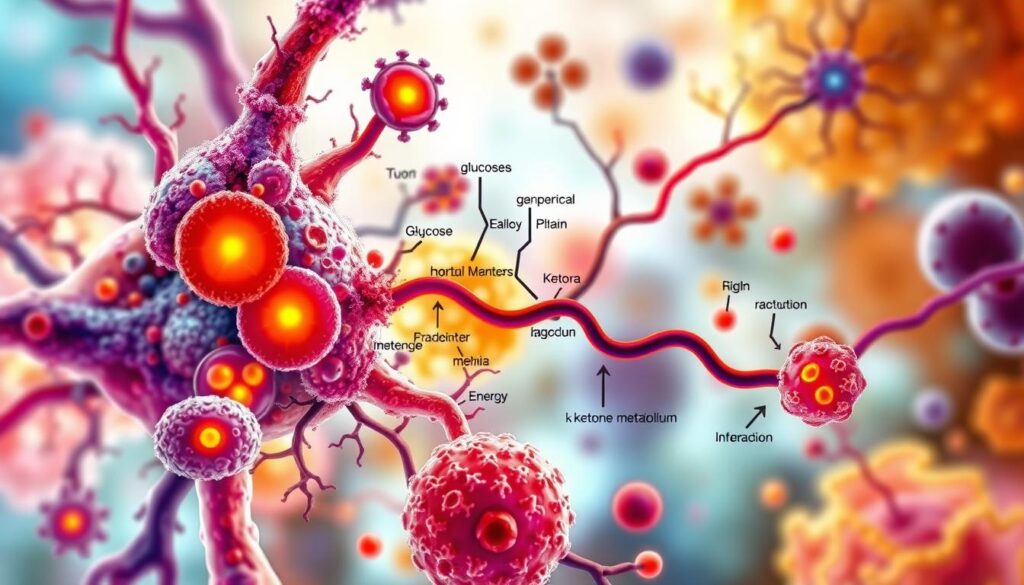
The ketogenic diet has shown promising results in certain animal models, but its efficacy and safety in human cancer patients remains to be fully established through rigorous clinical trials explains Dr. Emily Simmons a leading cancer researcher at the University of California, San Francisco.
As scientists delve deeper into the link between ketogenic diets and cancer caution is crucial. The benefits are promising but we need more human studies before we can make recommendations for cancer treatment.
Understanding the balance between glucose, ketone bodies insulin, and metabolic changes with PIK3CA mutations is essential for safe and effective use of ketogenic diets in cancer care.
Plant Based Diets Mechanisms and Cancer Prevention
Plant-based diets are getting more attention for fighting cancer. They are full of phytochemicals, which are antioxidants and anti-inflammatory agents. These compounds can fight off harmful free radicals and lower chronic inflammation, both linked to cancer.
Role of Phytochemicals
Plant-based foods like fruits, veggies, whole grains, and legumes are packed with phytochemicals. These have been studied for their ability to stop cancer cells from growing and dying. They can also stop tumors from getting blood supply.
Fiber and Gut Health
Plant-based diets are high in fiber, which is good for the gut. A healthy gut microbiome is linked to lower cancer risk. It helps with inflammation, immune function, and breaking down harmful substances.
Anti-inflammatory Properties
Chronic inflammation increases cancer risk. Plant-based diets, with their omega-3 fatty acids, antioxidants, and fiber, can reduce inflammation. They also avoid pro-inflammatory foods like processed meats and refined carbs.
A review of 2,234 studies showed plant-based diets lower cancer risk. These diets include vegetarian, vegan, and Mediterranean diets. They support overall health and may reduce cancer risk.
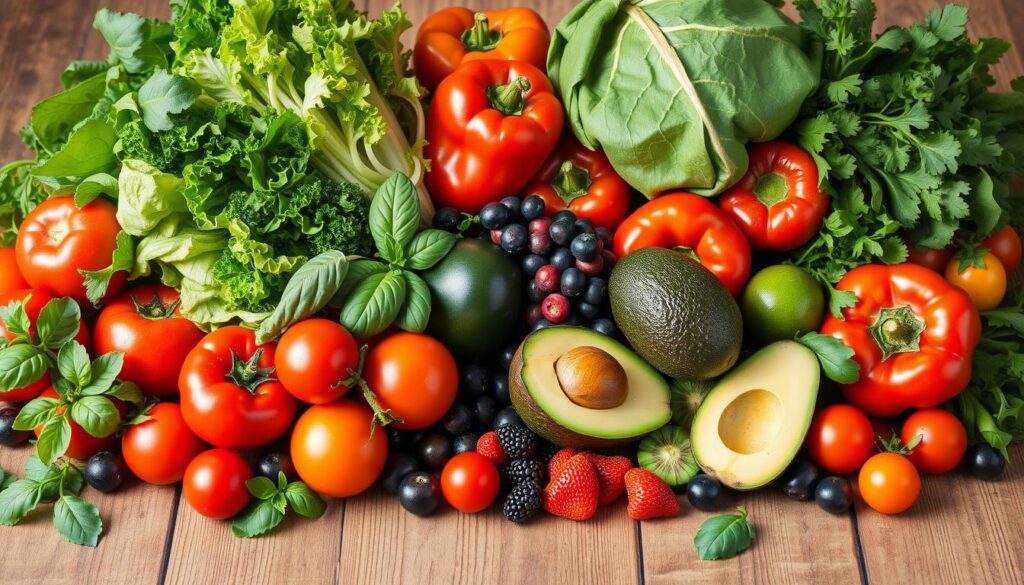
A healthy, balanced diet has been shown in observational studies to reduce cancer risk and improve cancer treatment outcomes.
| Plant-Based Dietary Pattern | Effect on Cancer Outcomes |
|---|---|
| Vegetarian/Vegan Diet | Pooled hazard ratio HR for overall cancer mortality: 0.97 with 95% confidence interval CI of 0.88–1.06 |
| Mediterranean Diet | Pooled hazard ratio HR for adherence and cancer mortality: 0.84 with 95% confidence interval CI of 0.79–0.89 |
Impact on Cancer Treatment Outcomes
There’s no single diet that can cure cancer alone. But, some diets might help treatments work better or lessen side effects. Research shows that plant-based and ketogenic diets could improve cancer treatment results.
Plant-Based Diets and Cancer Treatment
Studies suggest that eating lots of whole plants can lower chemotherapy side effects and joint pain from breast cancer treatments. These diets are linked to a lower risk of cancer and death.
Ketogenic Diets and Cancer Treatment
The ketogenic diet might help manage high blood sugar from some cancer treatments. Ongoing trials are looking into its benefits for cancers like brain, lung, pancreatic, and ovarian.
| Dietary Approach | Potential Benefits | Limitations |
|---|---|---|
| Plant-Based Diets |
|
|
| Ketogenic Diets |
|
|
While the research is promising, it’s crucial for cancer patients to talk to their healthcare providers. They should figure out the best diet to support their treatment and health.
Metabolic Effects and Weight Management
Plant-based and ketogenic diets can greatly affect metabolic health and weight in cancer survivors. Plant-based diets lower fasting plasma insulin and improve insulin sensitivity. These are key in fighting obesity, diabetes, and cardiovascular disease.
Ketogenic diets also lower insulin levels. But, their long-term effects on metabolic health and cardiovascular health are not fully understood. Cancer survivors face a higher risk of metabolic disorders. So, diet plays a big role in managing their health long-term.
Insulin Response
Plant-based diets improve insulin response. Research shows they decrease fasting plasma insulin and boost insulin sensitivity. These changes help keep blood sugar regulation healthy and prevent obesity and type 2 diabetes.
Blood Sugar Regulation
Ketogenic diets lower insulin levels, which helps those with insulin resistance or type 2 diabetes. But, their long-term effects on cardiovascular health need more study. More research is needed to understand their full impact on metabolic health.
Dietary changes, whether plant-based or ketogenic, can greatly impact cancer survivors’ metabolic health. By improving insulin sensitivity and blood sugar control, these diets help reduce risks of obesity, diabetes, and cardiovascular disease.
Safety Considerations and Potential Risks
Vegetarian and ketogenic diets may help in cancer treatment. But, it’s important to think about the risks and safety issues. It’s key to plan and watch closely to keep cancer patients healthy.
Nutrient Deficiencies: Vegetarian diets can cause a lack of vitamin B12, iron, and zinc if not balanced right. Ketogenic diets might also lead to a lack of vitamins and minerals because of the low carb intake.
Cardiovascular Risk: The ketogenic diet’s high fat can worry about heart health. Some studies show it might raise bad cholesterol levels, increasing heart disease risk. It’s vital to check blood lipids often for those on a ketogenic diet.
Lean Mass Loss: The ketogenic diet’s low carbs can cause losing muscle mass. This is bad for cancer patients who already risk losing muscle. Eating enough protein and doing strength exercises are key to keep muscle.
Long-term Health Effects: We don’t know much about the long-term effects of very low carb diets in cancer patients. More research is needed to understand the risks and benefits fully.
Cancer patients should talk to their healthcare team, including dietitians, to make a diet plan that fits their needs. This plan should aim to reduce risks and improve health during treatment.
The ketogenic diet may have potential benefits for certain cancer types, but it’s crucial to consider the potential risks and work closely with healthcare professionals to ensure safe implementation. – John Doe, Oncologist
Implementing Dietary Changes During Cancer Treatment
Changing your diet during cancer treatment is complex but crucial. Patients need to work with their oncologists and dietitians. Together, they create diet plans that meet the patient’s nutritional needs and treatment goals.
Timing and Transition Strategies
The right time for dietary changes is key. Nutritional needs can change during treatment. A slow transition to a new diet, like vegetarian or ketogenic, helps avoid side effects. Regular checks and tweaks are needed to keep the diet effective and easy to follow.
Working with Healthcare Providers
It’s vital to work with healthcare providers like oncologists and dietitians. They offer nutritional counseling, create personalized diet plans, and focus on integrative oncology. This approach covers both medical and nutritional care.
| Dietary Approach | Carbohydrate Intake | Protein Intake | Fat Intake |
|---|---|---|---|
| Standard Diet | 50-60% (250-300 g) | 15-20% (75-100 g) | 20-35% (45-78 g) |
| Paleo Diet | 20% (100 g) | 15-20% (75-100 g) | 60-65% (133-145 g) |
| Ketogenic Diet | 5% (25 g) | 15-20% (75-100 g) | 75-80% (167-178 g) |
Working with healthcare providers helps cancer patients manage dietary changes. This way, they can support their health during a tough time.
Conclusion
Plant-based diets show promise in lowering cancer risk and helping cancer survivors. Ketogenic diets might also help in some cancer types. But, we need more research to know their full benefits and safety.
It’s important to tailor nutrition plans to each person. This is because everyone reacts differently to food. More studies are needed to understand how diets affect cancer cells and overall health.
Researchers should look into how diets change cancer cell metabolism and immune function. We also need to find better ways to measure the effects of nutrition on cancer. Patients should work with their doctors to create a nutrition plan that fits their needs and the latest research.
Using evidence-based nutrition and personalized medicine can help patients take charge of their cancer care. As cancer research grows, using new dietary strategies will be key in improving cancer treatment and prevention.
